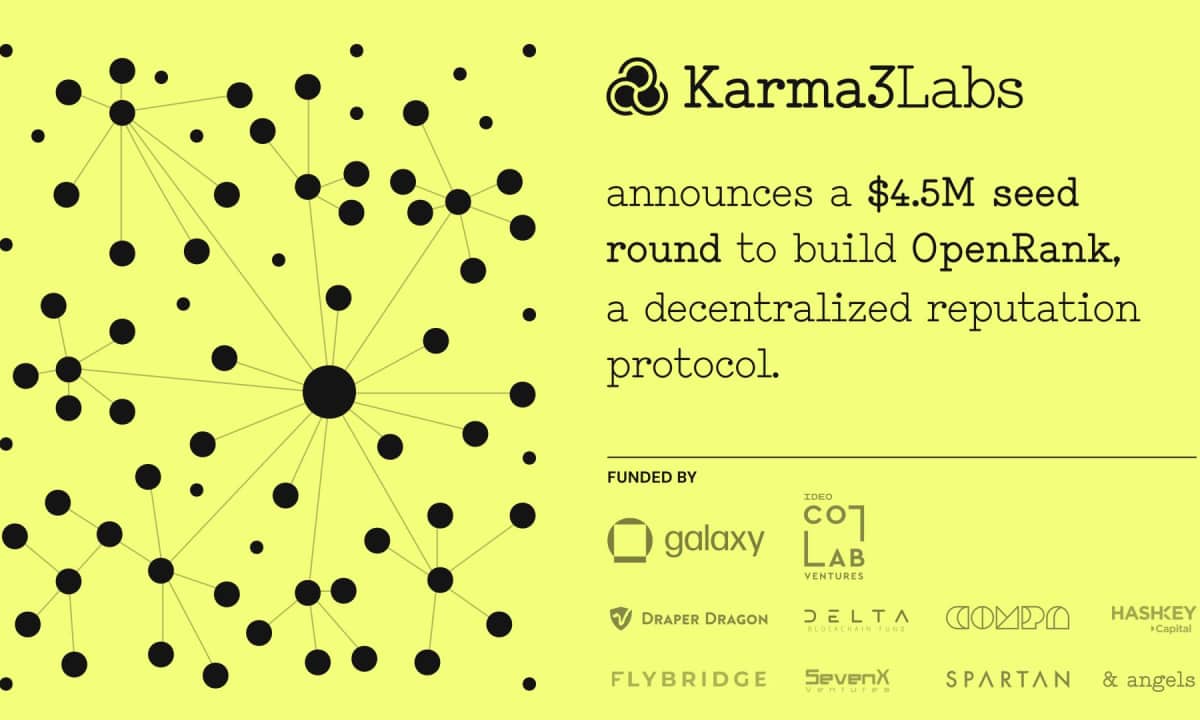[PRESS RELEASE – Palo Alto, California, March 1st, 2024]
Using OpenRank, developers and web3 companies can build consumer apps where people can discover, use, fund, read, or buy something on-chain without worrying about getting spammed or scammed.
Karma3 Labs has raised $4.5M in seed funding led by Galaxy and IDEO CoLab Ventures to build OpenRank, a decentralized reputation protocol. Using OpenRank, developers and web3 protocols can power consumer apps, communities and marketplaces with an open ranking and recommendation layer that provides users with security and peace of mind when making decisions onchain, without having to trust centralized gatekeepers. Some of the early use cases of OpenRank include leveraging a community rating system for App Marketplaces like Metamask Snaps; Ranking and Recommendation APIs for Lens and Farcaster; On-Chain discovery feeds for consumer apps and wallets; and reputation-based voting and governance.
Introducing trust and reputation mechanisms is critical to web3, just as it has been for web2, where there have been countless use cases in decentralized peer-to-peer utility. For example, Uber decentralized taxi services because of driver ratings; AirBnB decentralized hotels because of host ratings; eBay decentralized the shopping mall because of seller ratings; Reddit decentralized gated community forums because of user karma badges; Google allowed for the practical use of the decentralized web because of PageRank. However, none of these services were able to be fully decentralized because a single entity owned the reputation scores. To prevent centralized gatekeeping, there is a need for decentralized reputation mechanisms. Such reputation systems need to be open-source, permissionless, flexible to different contexts, and Sybil-resistant.
OpenRank solves for this in web3, creating a decentralized reputation mechanism that sets the foundation for a future where peer-to-peer interactions and collective community intelligence power a decentralized web of trust, rendering centralized gatekeepers obsolete. The protocol aims for a scenario where Twitter’s Community Notes like system was possible, but not owned by a single company, openly and cheaply accessible to any developer, who could define their own algorithm of choice.
“A decentralized internet characterized by fairness and transparency hinges on the existence of a robust reputation system,” said Sahil Dewan, founder and CEO of Karma3 Labs. “We believe that on-chain social and consumer experiences will need a decentralized reputation protocol and we’re excited to onboard builders and developers for OpenRank.”
OpenRank enables any developer to permissionlessly compute on Reputation Graphs for ratings, ranking or recommendation for their apps or communities. These graphs can be constructed using on-chain or any peer-to-peer social graph data. Using graph algorithms, like EigenTrust, the OpenRank will enable verifiable compute on these reputation graphs.
OpenRank leverages zero-knowledge proving systems for running graph algorithm computations. Developers can use any on-chain data that suits their application context without having to worry about the cost or verifiability of computing on the data. Consumer applications and marketplaces will be able to integrate context-specific, native rankings and recommendations seamlessly. Moreoever, developers can also leverage rankings and reputation from other ecosystems and communities to bootstrap their own reputation system. OpenRank believes that a reputation compute layer in web3 would allow a broader range of useful applications, including those that resist cryptographic or game-theoretic mechanisms of trust. To achieve this, the team needs a system that is resilient to Sybil contexts, provides scalable compute and can be permissionlessly used by any developer.
“OpenRank represents a pivotal advance in web3 social and on-chain interactions. We’ve seen the impact PageRank has had in web2 and there is a massive opportunity to build a similar reputation primitive on-chain,” said Mike Giampapa, General Partner of Galaxy’s venture team. “We’re excited for the future of Karma3 Labs and what they’ve built with OpenRank, and are proud to lead the company’s seed round.”
The fundraise was led by Galaxy and IDEO CoLab Ventures, with participation from Spartan, SevenX, HashKey, Flybridge, Delta Fund, Draper Dragon, and Compa Capital. Angel investors from Xooglers Fund and veterans from Coinbase, ConsenSys, IPFS, along with Andrew Hong from Dune Analytics and Liang Wu from the Harvard Crypto Lab also invested in the seed round. The raise enables OpenRank to broaden adoption across early use cases and help launch protocol v1 for developers, ushering in a new era of permission-less and verifiable reputation computation.
“Karma3 Labs and the OpenRank protocol for reputation and trust will enable radical innovation around choice, personalization and safety for a rapidly evolving internet. We are excited to see OpenRank already being implemented to enable open marketplaces, spam reduction and choose your own algorithms. This only scratches the surface of what’s possible and we look forward to working with the Karma3 Labs team to bring these possibilities to life,” said Joe Gerber, Managing Director of IDEO CoLab.
About OpenRank
OpenRank is a decentralized reputation protocol founded by Karma3 Labs. OpenRank introduces decentralized reputation mechanisms that set the foundation for a future where peer-to-peer interactions and collective community intelligence power a decentralized web of trust, rendering centralized gatekeepers obsolete. With OpenRank, we can build a more reputable world.
Contact
Karma3 Labs
[email protected]
Binance Free $100 (Exclusive): Use this link to register and receive $100 free and 10% off fees on Binance Futures first month (terms).
